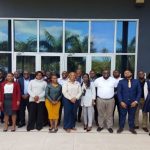Under its Water Supply and Sanitation Regulation Training Centre inaugurated in March 2024, ESAWAS organized its second-tier in-person regulatory training in “Compliance Monitoring, Reporting, and Enforcement”. The training which took place from 18th to 21st June in Dar es Salaam, Tanzania was attended by 43 participants from 13 African countries. The participants comprised legal, technical, and financial staff from regulatory entities including a delegation of directors from the Ministry of Water and the cabinet office in Malawi. The participants deemed the course as long overdue based on the exchanges among countries and details of insights in conducting inspections.

“This training was a complete package, it discussed aspects which are not always considered in available training programmes on regulation” Ali Ramadhan Kombo, Zanzibar Utilities Regulatory Authority.
The course provided detailed knowledge on monitoring and reporting the quality of service against set standards and requirements, and enforcing compliance by service providers. Considering the varying positions and responsibilities of participants, the programme included foundational knowledge on the basics of Water Supply and Sanitation (WSS) services provision and regulation to provide a fundamental understanding of the characteristics of WSS infrastructure and services as well as the objective of regulation and how it relates to WSS services provision. The training delved into the intricacies of compliance monitoring, reporting, and enforcement under the following modules:
- Introduction to compliance monitoring, reporting, and enforcement
The introductory course explained the process of regulatory compliance monitoring, reporting, and enforcement highlighting its objectives, and principles, as well as types, planning, and execution of inspections.
- Technical inspections
The module discussed in details the key aspects to consider while monitoring WSS infrastructure and Quality of Service Standards. These include infrastructure facilities from water intake to end users, asset management, risks monitoring and measures for Non-Revenue Water management.
- Commercial inspections
The module looked at customer contacts and engagements during WSS service provision. It highlighted the aspects of focus while conducting commercial inspections and these include customer records, billing, collection as well as complaints management.
- Financial and Human Resource inspections
The module discussed the procedures and mechanisms to assess and ensure the sustainability of the utility and its capabilities to execute its mandate. It emphasized the principles of tariff structure, financing models, and aspects to check such as utility’s strategic plan, business plan, procurement procedures as well as financial and human resource management.
“The training was very informative. As an economist, I have learned the technical aspects of inspections in WSS regulation” Rachael Nginilla, Energy and Water Utilities Regulatory Authority, Tanzania
WSS service provision involves participation of private thus, contract regulation was also discussed to provide fundamentals on structuring and legal modelling of WSS service provision contracts. It highlighted different types of contracts, licensing and permitting frameworks to engage private operators, and the role of regulator in contract management for WSS service provision.
As part of the training, participants undertook fieldwork for practical application of inspections at the Upper Ruvu Water Treatment Plant and Bagamoyo branch under Dar es Salaam Water and Sanitation Authority (DAWASA). Using the checklist developed by Energy and Water Utilities Regulatory Authority (EWURA) of Tanzania, participants were able to collect information both positive aspects and shortfalls on technical, commercial and financial operations of the utility. The training concluded with the preparation of inspection findings and enforcement procedures for areas of non-compliance.

The training was highly commended by the participants to have gained new knowledge and learning on compliance monitoring, reporting and enforcement, despite having applied some of the concepts shared on a day-to-day basis.
“This training was vital for us; the knowledge acquired will enable us to enhance our performance and provide adequate guidance to service providers for the improvement in their operations” Célestin Kouma Kengue, Organe de Régulation du Secteur de l’Eau, Congo Brazaville






